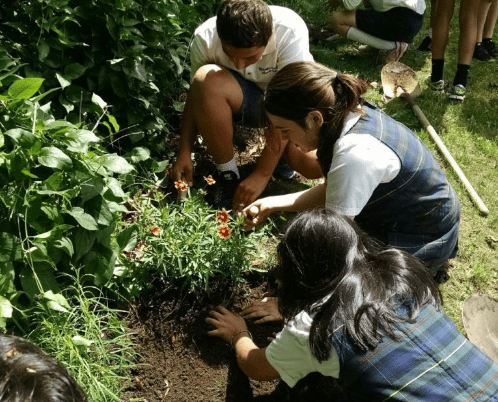Every year, teachers from across Massachusetts join The Green Team to integrate environmental education and actions with their students. There many are Eco-Stars out there who do wonders in their school, and we are very grateful for the teachers and students who work to improve our environment. In the 2017-2018 school year, we were pleased to spotlight so many inspiring schools!
Arlington Middle School, Lawrence
Arlington Middle School ActiGators in Lawrence created a fantastic Green Team video series. In addition to the E.L. Harvey field trip video below, they also have videos about the Dos and Don’ts of Recycling and Green Goals from the Great Green Genie.
Mount Alvernia Academy, Chestnut Hill, MA
Mount Alvernia Academy enjoyed being part of The Green Team. The students learned valuable lessons throughout the school year. They were dedicated to the protection of the environment.
Peirce School, Arlington, MA
All nine public schools in Arlington participated in a Textile Recovery Challenge competition between March and April to see who could collect the most textiles. They collected hundreds of bags of textiles among them!
Warwick Community School, Warwick, MA
Warwick Community School set up two new garden compost bins, repaired the outdoor lunchroom food compost bin, and will be comparing and contrasting the effectiveness of each bin to evaluate which system is better. They report that the benefits from this activity include learning about decomposers, reducing school-based waste, and learning about worm anatomy and reproduction.
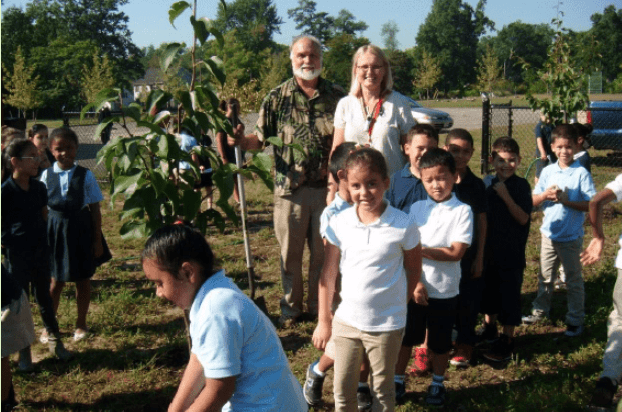
Greenfield Math and Science Academy, Greenfield, MA
Students at the Greenfield Math & Science Academy in Greenfield created a film about recycling and composting for the Greenfield Schools Film Fest.
Last Spring, all schools in the Greenfield Public School District started collecting food scraps from their lunchrooms and sending them to Martin’s Compost Farm. A recent post on the CET blog describes how wasted food is transformed into a nutrient-rich soil amendment at compost operations like Martin’s Compost Farm. The creation of this district-wide program to divert wasted food from disposal was made possible by a grant from the MassDEP Sustainable Materials Recovery Program.
Leroy L. Wood Elementary School, Fairhaven, MA
Students at Leroy L. Wood Elementary School in Fairhaven repurposed pinecones to create bird feeders. Students sold these birdfeeders as a fundraiser and donated the funds they collected to the Fairhaven Community Trail Network. This funding can be used to build bridges on the trail right near their school.
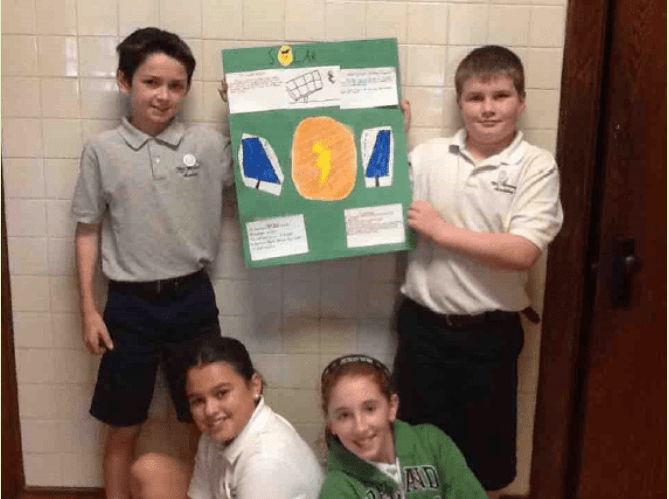
Dennis-Yarmouth Regional High School, Dennis, MA,
Students at Dennis-Yarmouth Regional High School in South Yarmouth made posters and collected items for Cradles to Crayons. The school collected winter clothes, books, and arts and crafts supplies. This activity connected unused items with people in need rather than sending those items to the trash.
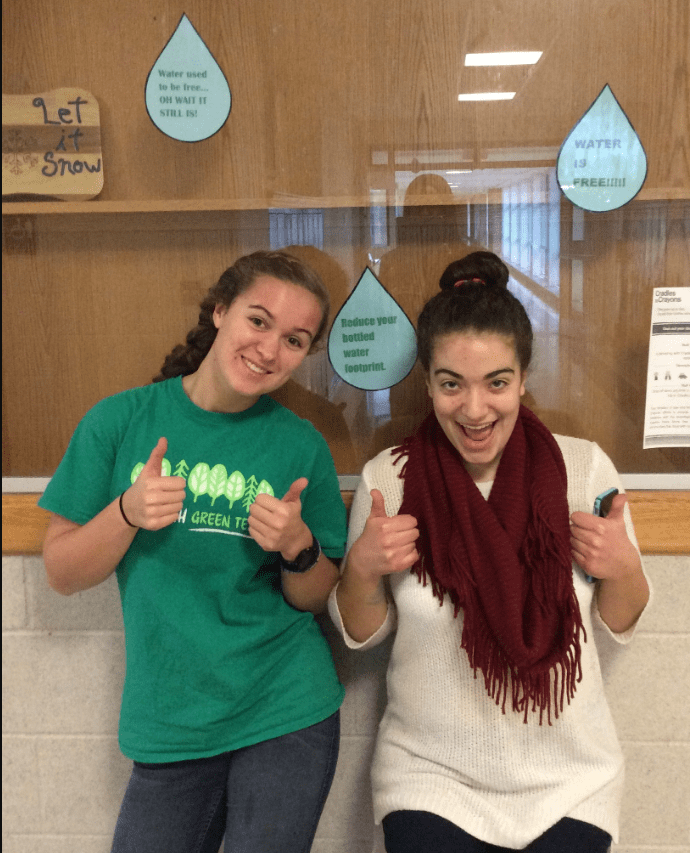
Hull High School also started collecting recycling in the gym, and athletic fields, expanded its compost program, and built three raised garden beds.
Sharon High School Pathways Program, Sharon, MA
As part of their effort to improve recycling at their school, students at Sharon Middle School created a display of all the items thrown in the trash one week that should have been in the recycling. The display was eye-catching and made an impact on students who paid more attention to how they disposed of their trash and recycling in the weeks that followed.

Sprague Elementary School, Wellesley, MA
A team of approximately 25 students at Sprague Elementary School in Wellesley helped start a cafeteria recycling program. Students created signs about what can be recycled, and presented the program in a school assembly. One student even wrote a letter to the Board of Health in support of food donation. As a result of their efforts, the school now produces fewer than two bags of trash, down from the six generated before the program was implemented!
“Sprague’s success was dependent on learning from the Cafeteria Recycling Pilot conducted at Bates Elementary School, the support of Sprague’s principal, Susan Snyder, and the help of the Parent Green Team.” – Ellen Banthin, Sprague Elementary School, Wellesley
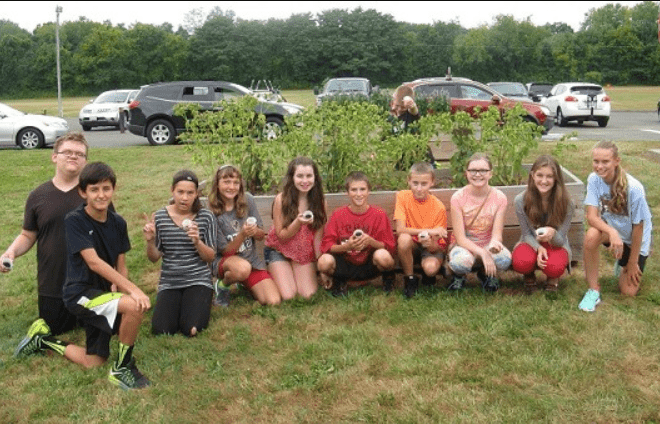
Captain Samuel L. Brown School, Peabody, MA
The Garden Club at Captain Samuel L. Brown School in Peabody teaches children the benefits of growing their own food, eating well, and how to start a garden at home. Students are mentored by members of the local adult garden club and work with a garden located in the front of the school that also serves as a resource for lessons. Some plants are started in an indoor hydroponic garden for student investigations. Decaying plants are used for science projects and the school is currently working with a Boy Scout to repair and expand the current garden to include a hoop garden bed.
Students also attended Peabody’s annual GreenFest, where they made items to sell (such as candles, crayons, upcycled pouches, and can tab jewelry), and presented eco-friendly science fair projects. The school was chosen as the site for this event four years ago because of their efforts with sustainability, and many former students return to help out.
South Street Elementary School, Fitchburg, MA
Students in the 21st Century After School Program at South Street Elementary School in Fitchburg started a recycling program. Students worked with the school’s custodian to set up recycling bins in all areas of the school, and also put up posters and sent out messages to classrooms. Two days each week students collected, sorted, and weighed the recyclables. They kept weekly graphs to learn about ways to limit what is going into landfills. This recycling effort is related to district-wide recycling assistance for the City of Fitchburg from a MassDEP Sustainable Materials Recovery Program (SMRP) grant, which provided funding to purchase recycling bins.
The school is also adding three raised gardens to three that are already being used. Students will plant a butterfly garden, an herb garden and a vegetable garden, and learn about composting.
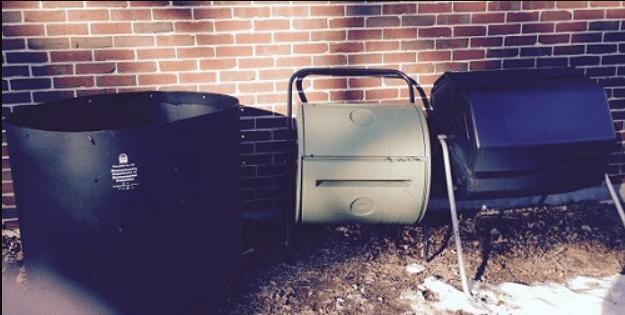
Bridgewater-Raynham Regional High School, Bridgewater, MA
Youth Environmental & Social Society (YESS) students at Bridgewater-Raynham Regional High School in Bridgewater have been busy with a number of environmental activities, including field trips, guest speakers, fundraisers, events, and hands-on activities! These activities are frequently written about in their school newspaper and shared with the local community.
Anne T. Dunphy School, Williamsburg, MA
The Green Team at Anne T. Dunphy School in Williamsburg participated in the Kids 4 the Earth million letter campaign. They wrote letters to the President expressing their concern for the Earth.
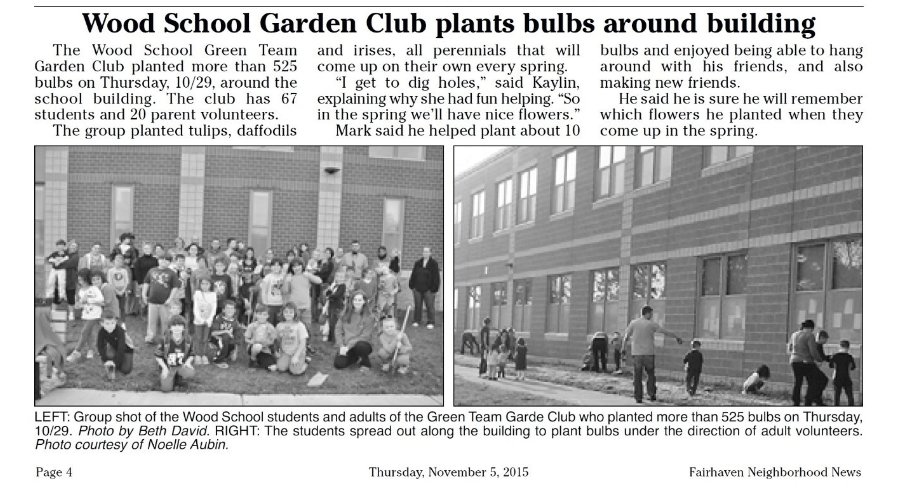
Rockport Middle and High School, Rockport, MA
At Rockport Middle and High School in Rockport, students are learning more about how plants grow and about hydroponic gardening. They planted a beautiful tower garden in the school’s new greenhouse.

Edward Parthum Middle School, Lawrence, MA
Students at Edward Parthum Middle School in Lawrence are GREENing their school through art. Middle school students are encouraging younger students to be aware of trash by painting garbage cans.

Sandwich Public School District, Sandwich, MA,
The Sandwich Public School District includes three schools: Forestdale School, Oak Ridge School, and Sandwich High School. In November of 2015, the Sandwich Department of Public Works received a grant from the MassDEP Sustainable Materials Recovery Program (SMRP) to improve the recycling collection program in their school district. The SMRP grant funded purchase of compactors and cart tippers to consolidate recyclable containers and paper collected throughout the district. MassDEP SMRP grants are a great resource to help school districts. See the MassDEP website for information on applying for a SMRP grant.

Katharine Lee Bates Elementary School, Wellesley Hills, MA,
In the spring of 2016, Wellesley’s Katharine Lee Bates Elementary School decided to examine the generation and management of waste in its cafeteria. Bates became the first K-12 school in New England to join the EPA’s Food Recovery Challenge, and also participated in the US EPA’s WasteWise program. As part of these programs, Bates embarked on a three-phase process to 1. Assess cafeteria waste, 2. Implement a program to reduce and divert a certain percentage of this waste, and 3. Evaluate the measures implemented. Their Cafeteria Waste Assessment Report found that 93% of the waste generated during their assessment could be donated for hunger relief, fed to animals, composted, or recycled. The report also outlines strategies for diverting this waste.

Newton Elementary School, Greenfield, MA
In December, Newton Elementary School in Greenfield started their program to compost food and
paper waste from both their cafeteria and kitchen. Like other schools in Greenfield, the compostable
materials are sent to Martin’s Farm for composting. In the first five days of this program, the school
collected 386 pounds of compostable materials and only 97 pounds of trash. The 4th graders help
monitor the separation of these materials at lunch and help weigh each bag.

Johnson Elementary School, Nahant, MA
In November, The Nahant Department of Public Works and the Johnson Elementary School Green
Team joined together to install Idle-Free Zone signs (provided by The Green Team) outside of the
school. Submit an application form to request free idle reduction signs or materials for your school.

Mount Alvernia Academy, Chestnut Hill, MA
The Green Team at Anne T. Dunphy School in Williamsburg participated in the Kids 4 the Earth million letter campaign. They wrote letters to the President expressing their concern for the Earth.

Congratulations to all Eco-Stars and keep up the great work!

